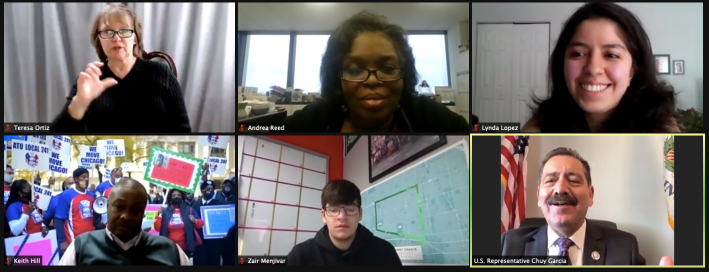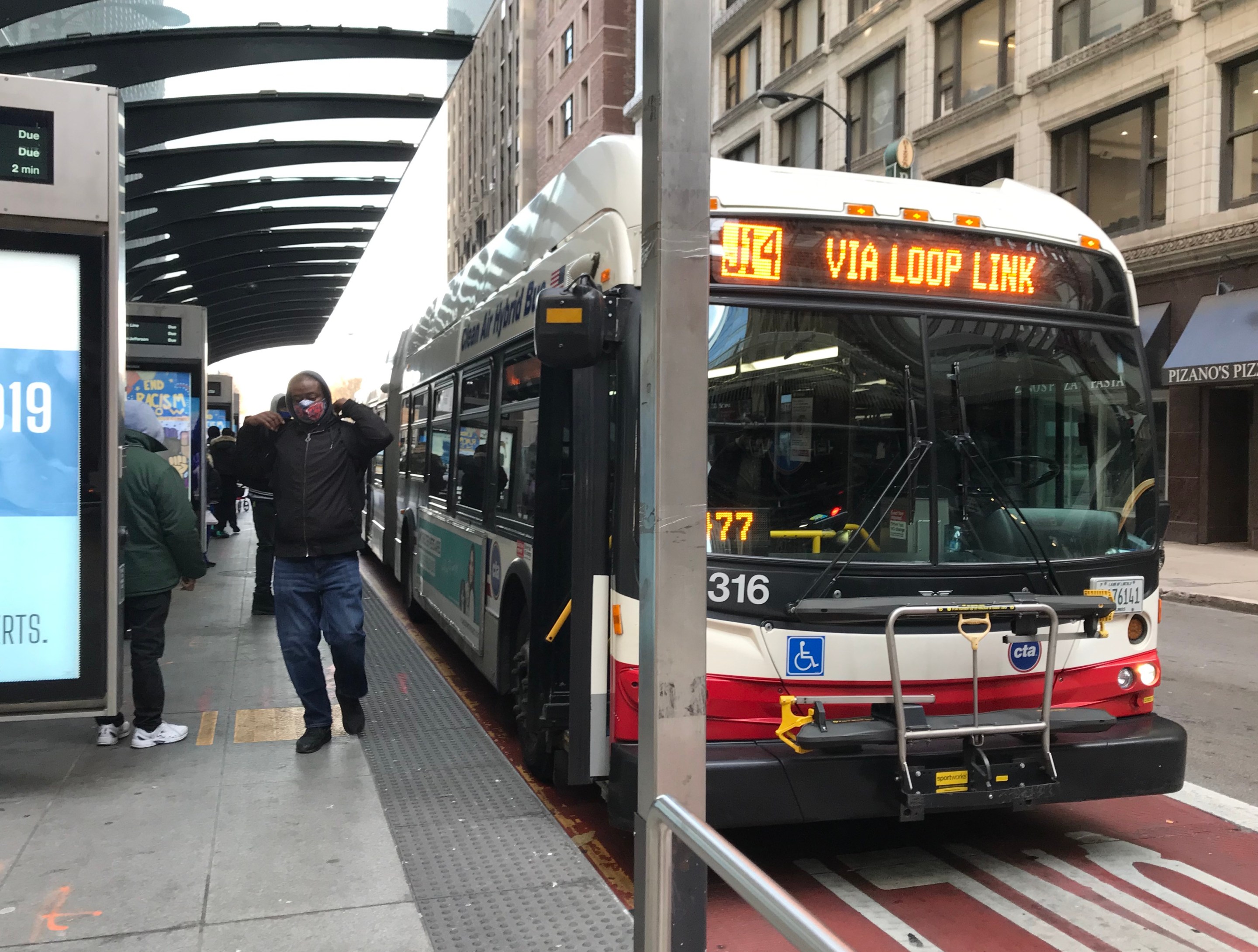For the last four years, labor unions, environmental groups and transportation advocates have commemorated February 4, Rosa Parks’ birthday, as a national day of action for equity in public transit. Last Thursday, the Active Transportation Alliance, along with the Metropolitan Planning Council and Chicago Jobs with Justice, held their first Transit Equity Day event, an hour-long virtual conversation featuring remarks from U.S. representatives Jesus “Chuy” Garcia and Robin Kelly, and discussion with a multi-generational panel of community organizers and activists.
ATA advocacy manager Lynda Lopez kicked things off by stating the premise of Transit Equity Day, that transit is a civil right. Lopez said transportation must be prioritized in federal pandemic recovery funding for the health of the greater economy. The necessity of a reliable and affordable public transportation system to Chicago’s essential workforce, which touches the lives of everyone, regardless of how they get around, was a central theme of the hour. In a recorded statement, Kelly acknowledged the impact the pandemic has had on Black and Brown communities, home to the majority of essential workers who rely on public transportation, and often lacking access to rapid transit and efficient and convenient bus service. Kelly committed to fighting for a state and local funding package, proposed at $20 billion.
Garcia, who was in the midst of a vote on the House floor, was able to join the call just long enough to make a rousing statement about the lifeline public transit provides. Garcia noted that, in Chicago, the public transportation system is a part of the city’s identity and daily civic life. “Quite literally transportation policy creates or tears down physical barriers to opportunities for minorities, for school-aged children, working parents, the elderly. For too long we’ve allowed cars to be the focus on how our cities are developed,” he said, citing the damage to Black and Latinx neighborhoods inflicted by the construction of the interstate highway system. Garcia mentioned a funding parity resolution he and 32 fellow congresspersons introduced in December, proposing an equal split of federal dollars to highways and public transportation. The current allocation is about 80/20 in favor of highways.
Keith Hill, president of Amalgamated Transit Union Local 241, which represents CTA bus drivers, echoed that a more equitable transportation system will only happen with increased financial support. “We call it transit deserts which keep minorities from being able to move across the city seamlessly,” he said. “Public transit should be affordable, accessible, reliable, clean, safe and friendly. Everybody wants transit, but they don’t invest in transit.”
Hill suggested reallocation of tax dollars and new sources of tax revenue as possible sustaining funding solutions. “When you build a high-rise that houses a hundred people, there should be a real estate tax [to fund transit],” he said. “There are models out there we could tap into.”

Andrea Reed, executive director of the Greater Roseland Chamber of Commerce and the Coalition for a Modern Metra Electric, noted that Fair Transit South Cook, a new pilot program that is reducing the cost of travel on the Electric and Rock Island lines, represents progress on transit equity in her community. “We’re so happy that Metra and Toni Preckwinkle have ignited the pilot we pushed for. Metra is an under-utilized asset in our community, providing rapid transit from the South Side to the Loop,” she said. “Unfortunately we’re in a pandemic and jobs are scarce, ridership is down.”
Reed also discussed the need for continued advocacy from community members. “The coalition is excited about the pilot program, but need everyone on board and the city of Chicago is not yet. The cry has to be a little louder,” she said. “Sometimes in our communities people have the mindset ‘it is what it is’ and there’s nothing we can do about it. We elect officials to carry our voice. Our voices need to be louder—in a constructive, well-thought-out plan, our voices can be heard.”
Zair Menjivar, a member of the Belmont Cragin Youth Leadership Council for the Northwest Side Housing Center, talked about how young people can speak up for the public transportation they rely on to get to and from school, work, and social activities. “Our priority should be how can we meet with our local officials and aldermen to allocate menu money to bike lanes,” he said. “Can we get CTA to do surveys of bus lines not running on time? We should push for funds and verbal agreements.”
An audience member asked Menjivar about his experience as the youngest person in the room for these conversations. He said, “It can be hard, sometimes you feel like they’re looking at you like ‘You’re a teenager, what do you know?’ But we’ve met with three aldermen, with state senators. We know there’s a lot of work that goes into installation of bike and bus lanes, but we want to get the ball rolling and keep pushing.”
The final comments came from Reed, who cited the Cost of Segregation study from the Metropolitan Planning Council, which reports over $4 billion in lost income and $8 billion in lost GDP due to racial segregation in Chicago and lack of access to good jobs within a reasonable commute time for people living on the South and West sides. The report also estimates the homicide rate in Chicago would drop by 30 percent, or 229 lives saved per year, if the level of segregation between African Americans and whites was reduced to the national median.
“[The study] woke me up to the fact that there are barriers and reasons why transportation does not go throughout our entire city,” Reed said. “The powers that be whoever they were decided to cut off transportation to parts of the city. Roseland has been cut off and suffered years of disinvestment. Trouble knows how to move around. It behooves all of us to care about how every community looks. We are our brothers’ keeper.”




